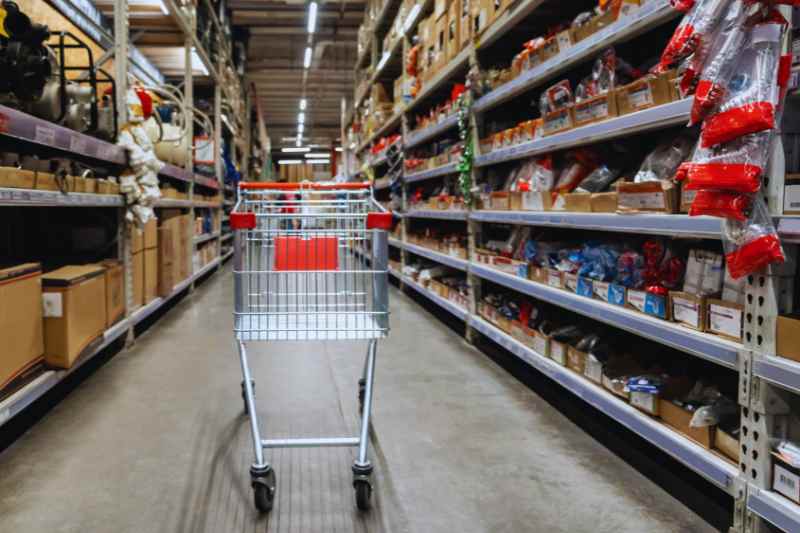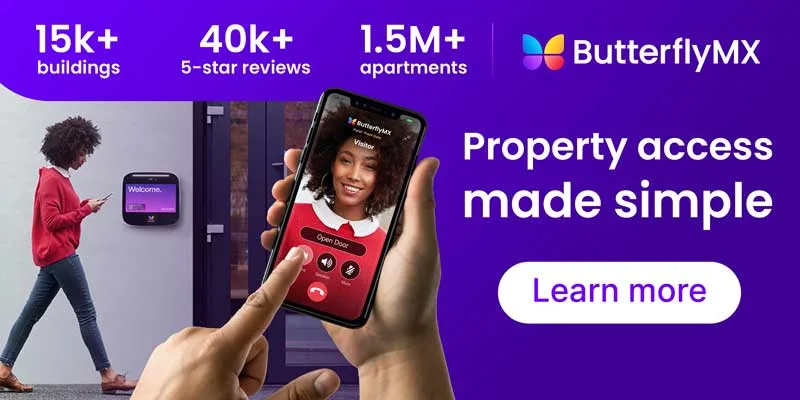Key takeaways
- Retail access control systems empower you to manage and verify access to your store and staff-only areas.
- Benefits of retail access control systems include improved security, less insurance liability, and employee arrival data.
- Retail access control includes biometric systems, smart locks, and cloud-based systems.
- Some unique security challenges for retail stores are shoplifting, vandalism, and unauthorized entry.

Commercial businesses and retail stores need security measures to protect employees, earnings, and merchandise. However, finding the best commercial access control for retail stores is difficult.
You need a system that meets all of your security requirements but doesn’t restrict customers’ movement.
This post reviews the benefits of physical access control systems and then covers the different types of access control systems that retail stores can buy.
This guide covers:
- What is access control in retail?
- Benefits of access control for retail
- The types of access control for retail stores
- Unique security risks of retail stores
- Enhance access control for your retail store with ButterflyMX
What is access control in retail?
Access control in retail is the system for managing and verifying access to the store and to staff-only areas. It allows you to secure your building without turning away customers. Access control for multi-tenant properties is usually paired with other security systems.
Access control is also especially convenient for guaranteeing security in multi-tenant retail properties where different stores occupy the same building.
Is retail theft really increasing?
Unfortunately, retail theft is on the rise. New York and Los Angeles have reported a 64% and 61% increase in theft and shoplifting, respectively.
Benefits of access control for retail
Benefits of access control systems in commercial stores include:
- Improved security. Security is the biggest benefit of access control systems. You can ensure that only authorized personnel have access to staff-only spaces. In turn, you secure cash earnings and merchandise from being stolen. Furthermore, access control also prohibits access to physical servers that might contain private customer and employee information.
- Health requirements. Supermarket access control ensures that perishable food, such as meat and dairy products, is handled only by professional staff before appearing on store shelves. Controlling access to food storage areas reduces the risk of contaminated products.
- Shift changes. Access control systems help manage staff members’ arrival and departure for shift changes. Additionally, as management, you can monitor who has entered the property and when they did so.
- Insurance liability. Insurance covers all the products you offer at your retail store. An efficient access control system also helps you if you ever have to make an insurance claim. This is because installing an access control system indicates that you have taken all proper precautions to protect your belongings.
- Legal liability. An access control system proves that you have taken security precautions to protect staff and customers on your property.
- 24/7 protection. Your retail space is likely closed with no staff members present for roughly as many hours as it is open. An access control system lets you know that your property is safe during closing hours.
Discover how access control systems work:
The types of access control systems for retail
While each individual access control system has unique features regarding building security, there are generally four different types of retail access control systems.
The four types of retail access control systems include:
1. Biometric access control
Biometric access control for retail stores grants users entry after scanning a bodily identifier such as their face, eyes (retina), or fingerprints. This is often a highly secure and foolproof security system that is trusted when securing sensitive spaces.
However, a biometric access control system is likely overkill for a retail store. You want employees to enter your property and restricted areas easily and quickly. You also want to control your access control system on the fly, even when you’re not at the store. In addition to those negatives, you also want a system that doesn’t take long to register new users.
2. Smart locks
Smart locks are a feature-limited yet effective access control method for some retail stores. As the name implies, they can lock down a specific area, and they feature several entry methods aside from a traditional physical key. A smart lock might be a viable option if you have only one room you want to lock down. However, smart locks are not recommended for securing an entire property. This is because they lack some user verification methods that more feature-heavy access control systems tend to have. Rather, smart locks are best suited for small businesses, single-family homes, and apartment units.
3. Cloud-based access control
In our professional opinion, cloud-based access control systems offer the best entry systems for your retail store. This is because cloud-based systems are the easiest to use and give you the most control as a manager. Notably, cloud-based systems are designed to handle many different users. Additionally, they can be customized and managed easily from mobile devices. A biometric lock, for example, takes longer to program for new employees or temporary users than a cloud-based system would.
Cloud-based access control systems often feature remote entry, which is particularly beneficial for retail stores. Retail stores receive a lot of deliveries. With remote and temporary access, delivery drivers can be let into the building securely without troubling any on-site staff members.
4. Touchless access control
Touchless access control for retail stores offers a convenient way to manage entry while enhancing security.
Your employees can seamlessly enter restricted areas without physical contact using mobile devices, key cards, or biometrics. For retailers, touchless access control improves operational efficiency and provides real-time tracking and remote management, allowing you to monitor access and adjust permissions from anywhere.
Unique security risks of retail stores
Here are some unique security challenges that retail stores face and how to solve them:
- Shoplifting
- Vandalism
- Unauthorized entry
- Crowd control during peak season
- Security in the event of emergencies
- Delivery management
- 24/7 operations
Shoplifting
Retail stores are prime targets for shoplifting, especially in high-traffic areas.
Solution: Access control systems can restrict entry to employees only, reducing the risk of unauthorized access and deterring shoplifters.
Vandalism
Stores in public areas face the risk of property damage, especially after hours.
Solution: Timed access control systems can automatically lock doors after closing hours. So, you prevent unauthorized entry when your store is unoccupied.
Unauthorized entry
Non-employees or contractors could access restricted areas like stockrooms or back offices.
Solution: Keypad access control ensures only authorized individuals can enter these zones, enhancing security for your high-value inventory.
Crowd control during peak season
Managing access to your store during sales events or peak seasons can lead to overcrowding and safety hazards.
Solution: Access control systems can limit the number of people entering simultaneously, helping maintain order and prevent overcrowding.
Security in the event of emergencies
In an emergency, it’s critical to ensure that only authorized personnel have access to specific areas.
Solution: Cloud-based access control systems can remotely lock or unlock doors during emergencies. So you ensure a quick response and safety at your property.
Delivery management
Retail stores often have multiple vendors and delivery personnel accessing stock areas.
Solution: Access control systems can provide temporary access codes to vendors and delivery personnel, reducing the risk of unauthorized entry.
24/7 operations
Some retail stores operate around the clock, increasing the risk of security breaches during late hours.
Solution: Access control systems with round-the-clock monitoring allow store managers to track who enters and exits during off-hours, ensuring security at all times.
Enhance access control for your retail store with ButterflyMX
The ButterflyMX Access Control System is the best way to enhance access control for retail stores because it utilizes the latest access control technology while still being simple.
ButterflyMX products are installed in over 15,000 buildings and have over 40,000 five-star reviews.
The ButterflyMX Access Control System is one of the best retail security products because it features:
- Cloud-based software. Store user data in the cloud and avoid needing cumbersome physical storage servers on the premises.
- Mobile controls. You directly control the ButterflyMX Keypad from your mobile device. When new employees are hired or move on, you grant and revoke access from your mobile device.
- Entry options. You and your employees can use their preferred credentials, as we support various access options, such as PIN codes, key cards, fobs, and a mobile app. This flexibility enables your property to operate efficiently while increasing security.
- Remote entry. Management and staff may unlock the ButterflyMX Access Control System remotely from their mobile devices. In addition, you can review entry logs to investigate potential security risks better.
- Integrations. The ButterflyMX Access Control System integrates seamlessly with our other products, giving you greater security control. Pair your access control system with our Security Cameras, Elevator Controls, or Smart Locks for a property-wide solution.

Learn more about ButterflyMX
Fill in the form below, and we'll email you right back.
Have questions?
Fill in the form below, and we'll email you right back.
